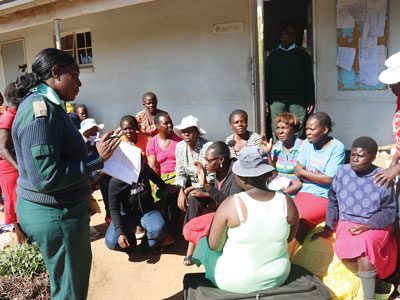
A FEW weeks after the emptying of female prisons, an organisation supporting female prisoners, the Female Prisoners Support Trust (Femprist), has dealt with 25 cases of former inmates who were shunned by their families after release from prison.
by VENERANDA LANGA
Femprist director Rita Nyamupinga said problems former prisoners faced after the Presidential amnesty included not having a place to go to as society considered them criminals.
On the other hand, male pressure group Varume Svinurai/Vukani Madoda feels most male prisoners were discriminated against by the Presidential amnesty, which saw more than 2 000 female prisoners being sent home, while male prisoners remained in cells.
This was after President Robert Mugabe, in an amnesty published in the Government Gazette No 36, general notice 85/2016, pardoned all convicted female prisoners regardless of their offences except two females — one on death row and the other serving a life sentence.
Nyamupinga said the amnesty was necessary at a time Zimbabwe was wallowing in economic hardships, with a very poor diet for prisoners.
She said reconciliation, rehabilitation, re-integration and reformation were necessary if the freed prisoners were to be accepted back into society.
- Chamisa under fire over US$120K donation
- Mavhunga puts DeMbare into Chibuku quarterfinals
- Pension funds bet on Cabora Bassa oilfields
- Councils defy govt fire tender directive
Keep Reading
“Female prisoners were removed from jail without adequate preparation to face their relatives and those that they offended. Their families and the offended were not ready to accept them and a systematic way was needed to be followed during the process of their release to reconcile them with families,” Nyamupinga said.
“We have dealt with 25 cases of women who experienced problems because their families refused to take them back after prison. Others found their husbands had married new wives and they had nowhere to go. Their properties had been sold or dished out to other relatives because they were serving long prison terms.”
According to Nyamupinga, the proper thing that should have happened before the amnesty was to sensitise communities and relatives that the prisoners were coming back home after the amnesty and, therefore, had reformed and needed to reconcile and be re-integrated back into society.
“The ZPCS [Zimbabwe Prisons and Correctional Services] takes care of prisoners’ needs during incarceration, but once they are set free, it is other organisations that take care of their rehabilitation needs to see if they are copying. It is people outside prisons that need information on rehabilitation, re-integration, reconciliation and reformation because they are failing to accept prisoners back,” she said.
Varume Svinurai/Vukani Madoda national chairperson Fred Misi said their organisation felt that emptying of female prisons with the exception of male prisoners was discriminatory and in breach of Section 56 of the Constitution.
Section 56(1) reads: “All persons are equal before the law and have the right to equal protection and benefit of the law, and Section 56(2) says; ‘Women and men have the right to equal treatment, including the right to equal opportunities in political, economic, cultural and social spheres’.”
Misi said men were always discriminated against, taking into cognisance that the Constitution favoured women by stipulating that they could not be sentenced to a death penalty, while men of ages 21 to 70 years could get a death sentence.
The only male prisoners who benefited from the amnesty were those terminally ill, under 18 years and over 60 years.
“We are seeing discrimination of men because women benefited from the amnesty, and men should equally have benefited. For instance, in 2014, six people — two women and four men — committed armed robbery and were sentenced to six years each. The two women are now free and the four men are still incarcerated, but they were all robbers,” he said.
“Females are also capable of committing heinous crimes because crime has no gender. I feel before the President decided to implement the amnesty, the Minister of Justice, Emmerson Mnangagwa, should have advised him of Section 56 (1) and (2) of the Constitution which stipulates equal benefits for men and women.”
He also alleged that sentencing of prisoners was biased, with women getting lighter sentences than their male counterparts.
“If a boy child is raped, sentencing of the woman that raped him should be as severe as that of a man that raped a girl,” Misi said.
But Nyamupinga said the President had good reasons to pardon all women because the nature of women was different from that of men, given some get incarcerated with babies or pregnancies.
“Some female prisoners are arrested while pregnant or with babies. Prisons for women were initially built to accommodate a few of them because of the assumption that women do not engage in criminal activity, but at Chikurubi Maximum Security Prison, 246 women were in the cells meant for fewer women,” she said.
Nyamupinga said government was unable to fend for babies of the female prisoners and so the need for the amnesty.
While her organisation has been giving psychosocial support for female prisoners and counselling to their family members, she said they faced transport problems to track down the female prisoners to see how they were copying after release from prison.
“I have been using my personal vehicle which has since broken down. One of our projects, Starting Point, entails giving former inmates groceries for two weeks while they find their feet, but it is underfunded. There is need for setting up of half way homes to accommodate 20 to 30 ex-prisoners at a time if their families do not want them back, or while we negotiate reconciliation,” she said.
Other ways which she said were pivotal for rehabilitation, re-integration, reconciliation and reformation were the introduction of a skills development centre, where they learn different crafts so as to make a living after coming out out of jail.












